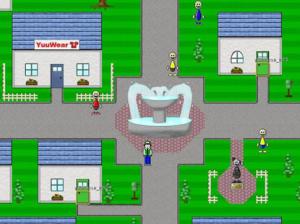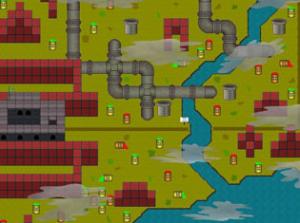Sometimes Class is all Fun and Games
Super Mario Brothers, Sonic, Final Fantasy VI, Chrono Trigger: We have all grown to love these video games and their characters, some more than others. To some TCNJ students though, the question isn’t how do you beat the game, it’s how do you create the game?


Super Mario Brothers, Sonic, Final Fantasy VI, Chrono Trigger: We have all grown to love these video games and their characters, some more than others. To some TCNJ students though, the question isn’t how do you beat the game, it’s how do you create the game?
Thanks to a recent $300,000 grant from the National Science Foundation, Kim Pearson, associate professor of English, and Ursula Wolz, associate professor of computer science, worked with colleagues from Villanova to create a course that combines digital media, storytelling, and computer science. The result is the two-semester Games course, which gives TCNJ students an “opportunity to really be immersed in the process of developing a piece of software,” said Wolz.
The course, which is in its fourth iteration, has featured a new game idea each year. This year’s students tackled the challenge of cross-institution collaboration and building a gaming engine that is modular enough so that it can be reusable for different games. Communication and collaboration between the students from TCNJ and Villanova was enabled by a wiki. On the wiki (which is a collection of Web pages that anyone can edit), status updates on the games were posted, as well as the gaming outlines.
The game development sequence is a yearlong effort, in which it takes two semesters to both create and implement the designs for a game. During the first semester, students started out by creating a design document or story bible, in which they outlined the different games they would create the following semester. The design document included the game’s elements such as graphics, small prototypes in a mock-up language, a storyboard, and an asset list. Technical elements—how the game is to be played, what game engine it will use, and how it will be coded—were also outlined in the document.
 In the course’s second semester, students implemented the designs, built the game, and tested out the video games. The three games implemented this year were TCNJ Role Play Group (TCNJ RPG), Super Character’s Name Land, and rice. Dan Tilden ’09, who worked in the TCNJ RPG group, said his game is a “stereotypical role-playing game taking place at The College of New Jersey, one which satirizes various aspects of the College in the process.” He said the group hopes to have the game posted onto TCNJ’s Web site “as a means to attract prospective students who are fans of video games.”
In the course’s second semester, students implemented the designs, built the game, and tested out the video games. The three games implemented this year were TCNJ Role Play Group (TCNJ RPG), Super Character’s Name Land, and rice. Dan Tilden ’09, who worked in the TCNJ RPG group, said his game is a “stereotypical role-playing game taking place at The College of New Jersey, one which satirizes various aspects of the College in the process.” He said the group hopes to have the game posted onto TCNJ’s Web site “as a means to attract prospective students who are fans of video games.”
In Super Character’s Name Land, the focus of the game is “to be a parody of popular video game culture,” said team member Scott Kieffer ’09, a journalism major. “There are a number of features and components in the game that make it different from the average 2D-RPGs that it mocks. The humor is the primary focus, most of the dialogue in the game is devoted to it, as are many of the game play and plot devices,” he said.
Sam McLaughlin ’09, a psychology major/fine art minor, said that the final outcome of the game rice will be “a playable demo that illustrates the concept of the game and several key mechanics. It will demonstrate the artistic aims of the game as well as the capabilities of the original game engine that the class is creating.”
The course sequence is not built on syllabi or deadlines, but rather on “deliverables,” an aim to get the game from design document into live demos. Pearson emphasized that “for us, it is never a matter of trying to complete the game and complete the game engine. It’s about how far you can get in terms of proof of concept.”
 Kelli Plasket ’10, an interactive multimedia and journalism double major (and frequent contributor to TCNJ Magazine) enrolled in the Games course, stated that the biggest benefit of the class was learning “project management skills.” Computer science major Tilden agreed, adding, “I’ve been gaining experience with time and project management.”
Kelli Plasket ’10, an interactive multimedia and journalism double major (and frequent contributor to TCNJ Magazine) enrolled in the Games course, stated that the biggest benefit of the class was learning “project management skills.” Computer science major Tilden agreed, adding, “I’ve been gaining experience with time and project management.”
While the students were learning invaluable project-management and game development skills, Wolz and Pearson said they have benefitted from teaching the course. “The games course has taught me a lot about how to do collaboration in way that is valuable for everybody,” said Wolz. “The students in the class aren’t really my students, we’re not really peers either, but there’s this aspect of coaching and mutual support and this master/apprentice model…. It’s an entirely different style of teaching, and it has impacted everything I do.”
Posted on May 14, 2009

